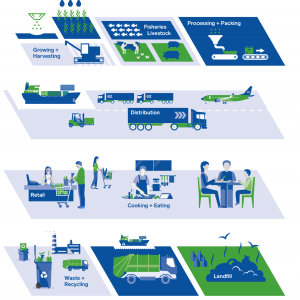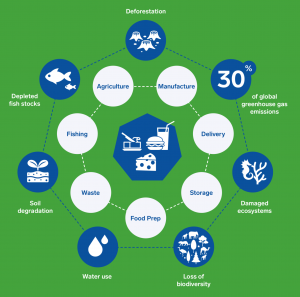This is going to be a hot topic. As a nation we have never had such access to food. Yet our diets are at their worst and the way we eat is unsustainable.
‘Sustainable Diets are those diets with low environmental impacts which contribute to food and nutrition security and to healthy life for present and future generations. Sustainable diets are protective and respectful of biodiversity and ecosystems, culturally acceptable, accessible, economically fair and affordable; nutritionally adequate , safe and healthy while optimizing natural and human resources.’ FAO, 201031
Our food system is responsible for 15-30% of Greenhouse gas emissions (GGE’s) in the UK. This is due to all stages of food production from farm to fork. From using farm machinery, processing and packing food, the transportation and storage of it to how we cook it, then the waste and recycling afterwards.
Foods that contribute the most to Greenhouse gas emissions are red meat, dairy and soft drinks, so consuming less of these will make a definite impact.

The production of food accounts for 70% of human water use, which is a huge amount. It is damaging our planet – through deforestation, pollution, a loss of biodiversity and damage to ecosystems.
In the UK we could make a huge difference to our planet just by focusing on not wasting as much food. An extra-ordinary 10 million tonnes of all food produced is spoiled or wasted in the UK every year. Whilst you may think restaurants and large scale catering is responsibly for this, actually the majority (71%) occurs in the home.

So what can we do to help? This week one blue dot – a toolkit on environmentally sustainable diets has been released by British Dietetic Association with guidance and research on how we can eat sustainably. Below I summarise the main points.
This imformation is undoubtedly going to raise the questions “So should we all go vegan?” My answer would be – Not unless you feel strongly about it or really want to. It’s about making swaps to some meals, eating less of some foods and having more plants in our diet. However also thinking about how and where we shop, what we do with food waste and packaging too.
Top tips:
- Reducing red meat intake to 70g or less a day. A lo Or commit to eating meat less times in your week. 50% of the UK population eat meat on a daily basis.
A reduction in current UK consumption of total meat (108g per day)1 for adults to 50-99g would reduce our carbon foot print by around 22% whilst a further reduction to below 50g per day would result in a 39% reduction.
- Switch to eating more beans, lentils and pulses, soya, tofu, mycoprotein, nuts and seeds. These are plant based swaps for meat. So a lentil bolognaise or using adding beans into a curry so that less meat is needed.
- Eat moderate amounts of dairy and include plantbased swaps. There is now a huge range of dairy alternatives, it is important to check these have added calcium in them.
- Choose fish from sustainable sources. Over fishing and poor fishing practices have impacted on fishing stocks and the marine ecosystem has been damaged.
- Eat more wholegrains including tubers and potatoes.
- Go for seasonal fruit and veg or choose frozen and tinned options.
- Tap water over soft drinks, tea and coffee. Soft drinks are a large contributor to our carbon footprint due to their processing and packaging.
- Reduce your food waste. This is a huge area for us to all focus on. Shopping for only what you need, using all the leftovers and being savvy with portion sizes can all help.
Reference: https://www.bda.uk.com/professional/resources/environmentally_sustainable_diets_toolkit_-_one_blue_dot